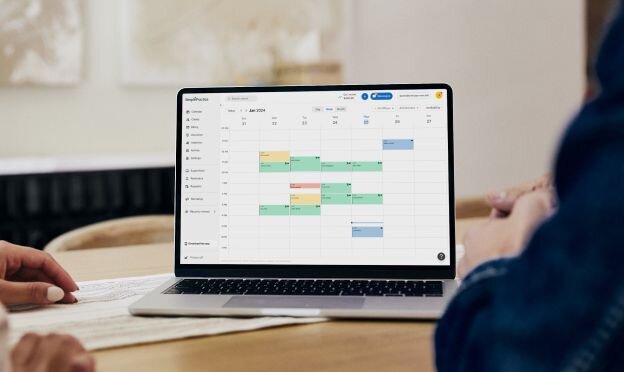Anxiety Due to Medical Condition ICD-10 Code
Download the mental health ICD-10 codes cheat sheet
Download free resource
Enter your email below to access this resource.
By entering your email address, you are opting-in to receive emails from SimplePractice on its various products, solutions, and/or offerings. Unsubscribe anytime.

Looking for the anxiety due to medical condition ICD-10 code? You’re in the right place.
Using the right ICD-10 codes is a key part of being a mental health clinician, especially when it comes to supporting the appropriate diagnosis and treatment plan and avoiding potential hiccups with insurance billing and reimbursement.
This article provides an overview of the anxiety due to medical condition ICD-10 code, including the diagnostic criteria, differential diagnoses, and when to use the anxiety disorder due to a medical condition ICD-10 code.
What is the ICD-10?
The International Classification of Diseases, Tenth Revision (ICD-10) is a guide published by the World Health Organization (WHO) that is used by clinicians globally. In the United States, clinicians refer to the ICD-10-CM, a clinical modification of the ICD-10 used for diagnosis codes.
Clinicians also use the American Psychiatric Association’s (APA’s) Diagnostic and Statistical Manual of Mental Health Disorders, fifth edition (DSM-5). The DSM-5 contains ICD-10 codes, along with more comprehensive diagnostic information and criterion.
The main reason providers use ICD-10 codes is to ensure standard diagnostic language to measure and track health information and identify trends, such as calculating the most frequently used mental health codes each year. Mental health providers in the U.S. use ICD-10 codes as part of their clinical note practices and for insurance reimbursement.
What is the ICD-10 code for anxiety due to a medical condition?
Anxiety disorders are some of the most frequently billed ICD-10 codes, appearing multiple times on our list of the 20 most commonly billed ICD-10 codes. However, the anxiety due to medical condition ICD-10 code is less common.
The anxiety disorders due to a medical condition ICD-10 code falls into the category “Anxiety disorder due to known physiological condition,” or ICD-10 code F06.4.
Clinical information specifies that it is an anxiety disorder with symptoms of anxiety that are directly related to the person’s medical condition.
Please note that the anxiety disorder due to a medical condition ICD-10 code excludes:
- Unspecified dementia
- Delirium due to a known physiological condition
- Other mental disorders associated with alcohol and psychoactive substances
- Anxiety disorders not due to known physiological conditions
The anxiety due to medical condition DSM-5 code is the same as in the ICD-10—code F06.4. However, the DSM-5 contains more detailed diagnostic criteria, which we’ve simplified below.
Diagnostic criteria for anxiety disorder due to known physiological condition
According to the DSM-5, the diagnostic criteria for anxiety disorder due to another medical condition includes:
A. Significant symptoms of anxiety or panic attacks.
B. Evidence that the client’s anxiety is a direct consequence of another medical condition.
C. The disturbance is not better explained by another condition.
D. The symptoms do not occur exclusively during a period of delirium.
E. The anxiety causes significant distress or impairment to social, work, or other important areas of the person’s functioning.
There are several medical conditions known to cause symptoms of anxiety, such as:
- Endocrine disease, including hyperthyroidism, hypoglycemia, hyperadrenocortisolism, pheochromocytoma.
- Cardiovascular conditions, such as congestive heart failure, arrhythmias, heart failure, and pulmonary embolism.
- Respiratory illnesses like asthma, pneumonia, chronic obstructive pulmonary disease.
- Metabolic disturbances such as vitamin B deficiency, porphyria.
- Neurological disorders, including neoplasms, encephalitis, seizure disorders, vestibular dysfunction.
When using this code, you would list the name of the client’s other medical condition within the mental health diagnosis. For example, “F06.4 anxiety disorder due to pheochromocytoma.”
Differential diagnoses for anxiety due to medical condition
Even though clients may meet some anxiety disorder due to known physiological condition criteria, there may be a more appropriate diagnosis, such as:
- Delirium and major or mild neurocognitive disorder: The anxiety due to a medical condition code cannot be used when the anxiety occurs exclusively during a period of delirium.
- Substance or medication-induced anxiety disorder: When making a diagnosis, clinicians should consider recent or prolonged substance use, which includes the use of medications that may have psychoactive effects, or exposure to a toxin.
- Anxiety disorder not due to a known medical condition: There are several diagnosis codes for anxiety, which may be used when there is no direct causative link between a medical condition and anxiety.
- Mixed presentation of symptoms: Clients may present with mixed symptoms of mood and anxiety, which could suggest another disorder.
- Illness anxiety disorder: Anxiety or worry about illness, pain, or bodily preoccupations.
- Adjustment disorders: Anxiety due to a medical condition may be considered alongside adjustment disorders with anxiety and depressed mood.
How to find the right diagnosis code for anxiety
A full list of diagnosis codes for all anxiety disorders, including the anxiety due to medical condition ICD-10 code, are available in the following digital and book formats:
- ICD-10 Data, a searchable ICD-10 database.
- The ICD-10 from the World Health Organization (WHO), under the subheading F40-F48 “Neurotic, stress-related and somatoform disorders” or F06 “Other mental disorders due to brain damage and dysfunction and to physical disease.”
- DSM-5 throughout the textbook and online. The hard copy contains a handy alphabetical list and numerical list of ICD-10 codes.
It is worth noting that, while the DSM-5 does contain accurate ICD-10 diagnosis codes for anxiety, they may not align with the most recent ICD version, diagnostic criteria, and other indicators.
How SimplePractice streamlines running your practice
SimplePractice is HIPAA-compliant practice management software with everything you need to run your practice built into the platform—from booking and scheduling to insurance and client billing.
If you’ve been considering switching to an EHR system, SimplePractice empowers you to streamline appointment bookings, reminders, and rescheduling and simplify the billing and coding process—so you get more time for the things that matter most to you.
Try SimplePractice free for 30 days. No credit card required.

